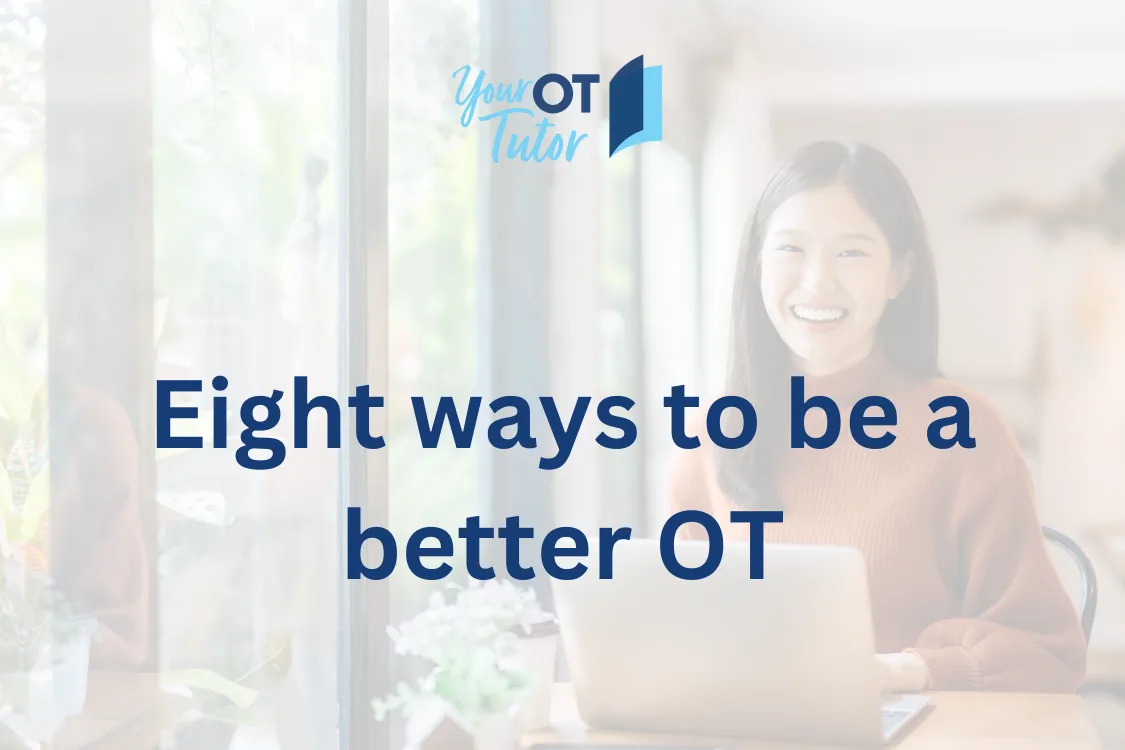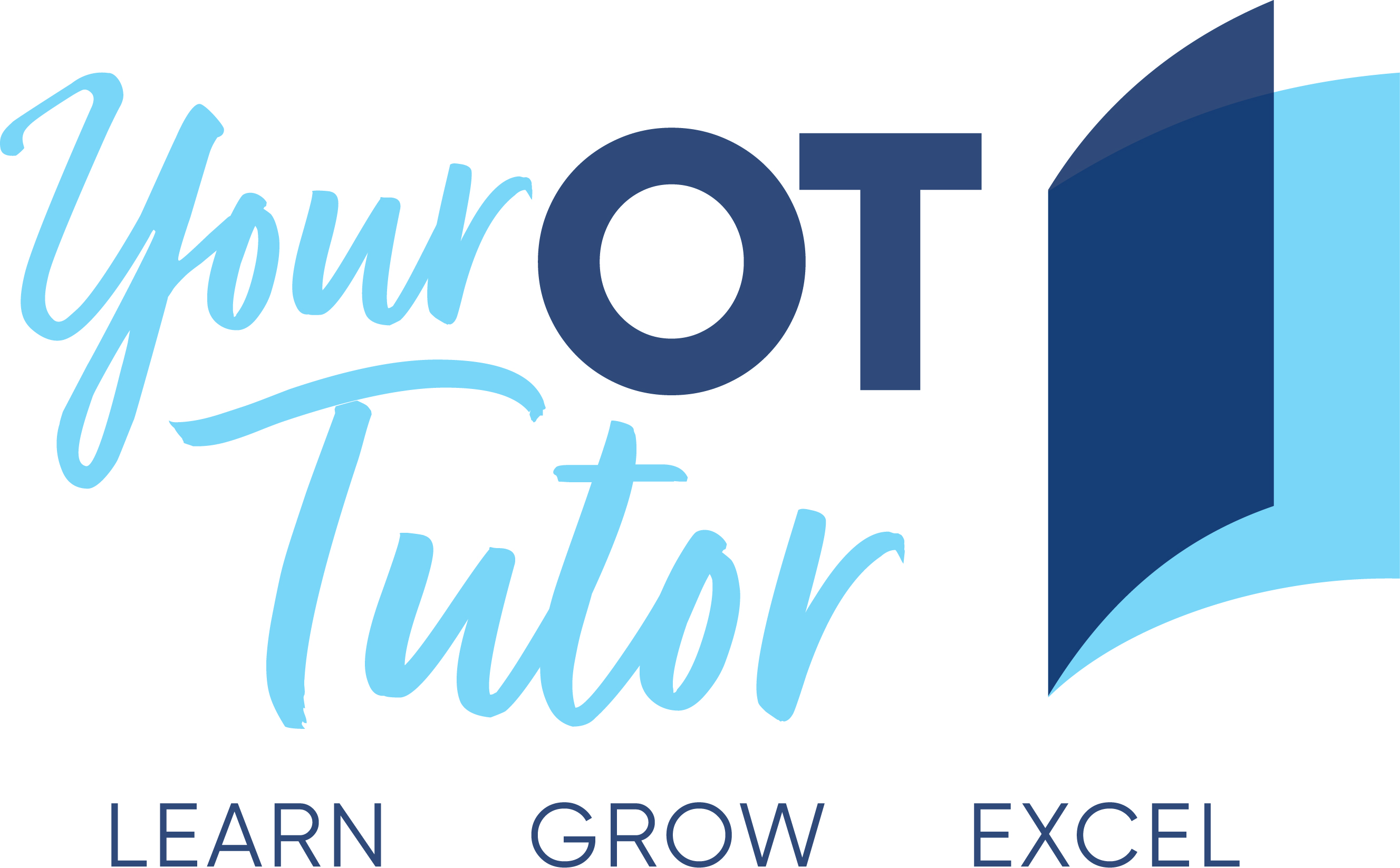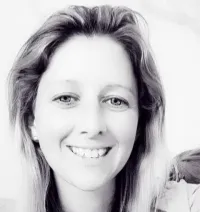THE YOUR OT TUTOR BLOG
Articles on important topics for occupational therapists...


Eight ways to be a better OT
I think I know the reason why many OTs aren’t delivering the best services they could be. It’s the same reason why if you’re an OT reading this, you may not be loving your work. You may feel like you’re getting through each day and doing a good job for your clients, but you’re wanting something more.
It’s because the busy, broken systems that we often find ourselves working in don’t allow us to prioritise learning, refreshing and applying our foundational OT knowledge and skills to their fullest extent.
But this is something we need to change. In the examples below I’ll show you how my Foundations of OT Success are so important for achieving better outcomes for our clients and ourselves. We need to make 2025 the year we prioritise going back to being better OTs who love what we do.
Foundation 1: Empower yourself
Skill: Ability to manage your time productively and efficiently.
What it looks like if this skill needs work: You’re a sole trader OT and work life is hectic. Your calendar seems to have admin space, but your to-do list never gets shorter. You’re trying to keep up with all the policy and process changes happening within your NDIS and Aged Care caseload, but you spend way too much time Googling and second-guessing yourself.
What it looks like when you’ve got this skill: You invest in some mentoring and learn some strategies for effectively managing your calendar. You also hear about some online Facebook groups where you can double-check the process of a specific funding application instead of wasting three hours trying to confirm the answer yourself online. Now your to-list is getting shorter and you managed to finish all the work you had scheduled for today on time!
NB: Most other Foundations can be looked at in any order, but this one really needs to come first; if you don’t look after yourself, you won’t have the time or headspace to work on improving all the other Foundations.
Foundation 2: Think like an OT
Skill: Using OT models and frameworks to guide your practice
What it looks like if this skill needs work: You receive a self-referral from a new NDIS client who would like you to write a letter for an item that is on the NDIS Supports “Out” list. You say, “sorry the NDIS won’t fund that” and don’t accept the referral.
What it looks like when you’ve got this skill: You know that while you may not be able to request that specific item via NDIS funding, you can go back to the start of the OT process (e.g. something like the Canadian Practice Process Framework) and help them in a different way. You accept the referral, manage expectations around current NDIS processes and offer to explore the functional issue the participant was having in the first place in case there is a different solution the NDIS will fund. You do your assessment, consider some options (one is on the ‘In’ list) and your client is happy to go with this new suggestion. The NDIS funds it, your client receives a different support, but they have overcome the functional difficulty they were experiencing in the first place.
Foundation 3: Be a proud OT Nerd!
Skill: Understanding the four pillars of evidence-based practice
What it looks like if this skill needs work: You’re a rural OT working with Aged Care clients in the community. A community nurse asks you to prescribe a ROHO cushion for a client you’ve just started working with, because they’ve got a Grade 1 sacral pressure area. You know the current clinical practice guidelines recommend the use of an air cushion for someone at high risk of pressure injuries, so you start to look for a ROHO supplier.
What it looks like when you’ve got this skill: You remember that research evidence is only one piece of the EBP puzzle. You consider the client’s poor postural stability and feel a ROHO will impact their independence with transfers. You also know the client has cognitive impairments and limited social support, so it will be difficult to ensure a ROHO is maintained appropriately (i.e. you consider client preferences/needs). You also know you’ve never setup a ROHO yourself before and this is a client with an unusual sitting posture, so you’re worried you could get it wrong given the urgency involved (i.e. you’ve considered your own expertise). And finally, while air may be a good option when someone is high risk, they are hard to come by in your local community so another option may be needed (i.e. you consider your practice setting/resources). You weigh up all these things and decide a stable, lower-maintenance, easily available deep contour gel cushion (the next best thing in the research guidelines), in conjunction with lots of education, will actually be the better option for your client.
Foundation 4: Connect and collaborate
Skill: Working effectively as part of a multidisciplinary team.
What it looks like if this skill needs work: You’re a new grad OT working for an OT-only company. You’re completing an FCA for a client with an upcoming plan review. They mention they also see a speech pathologist and would like that to continue. You note that down in your report and include justifications for why speech pathology may be helpful based on information you saw in an example FCA report your company provided. But you don’t actually speak with the speech pathologist. The plan comes back with capacity building cut because there was a ‘duplication of supports.’
What it looks like when you’ve got this skill: As soon as your client mentions they have other clinicians involved, you seek permission to speak with the speech pathologist so you can be on the same page with the reports you provide. You realise both OT and speech pathology had goals around improving socialisation with peers listed in your reports, and on paper they looked very similar. You discuss your approach, confirm you are working on slightly different goals in a different way, so change your wording so that it is clearly not a duplication of supports. The plan comes back with funding for both OT and speech pathology as requested in your FCA.
Foundation 5: Be an OT detective
Skill: Using a range of comprehensive information gathering approaches to inform your intervention choices.
What it looks like if this skill needs work: You’re a community Aged Care OT and you receive a new referral to see Norma, who is having difficulty with showering. You know this is often due to decreased mobility and poor environmental setup, so you come to the initial appointment with a shower chair and a tape measure, ready to draw-up a modification request for a new handrail. You ask a few questions, confirm Norma feels unsteady and nervous when standing to shower, so leave her the shower chair, and measure up a grabrail for her shower recess. When you visit four weeks later to address a new difficulty that’s popped up, you see the shower chair in Norma’s laundry buried under some clothes; she hasn’t been using it, and she’s been having sponge washes instead.
What it looks like when you’ve got this skill: You ask Norma what aspect of showering is difficult for her, but you also ask if you can speak with her daughter for further information. Norma’s daughter reports her mother’s best friend had a slip in the shower two months ago and fractured her hip; ever since then her mother has been anxious about showering by herself, however Norma hadn’t mentioned that to you. You also do a simulation of Norma’s ability to shower and can see Norma is relying heavily on holding the taps to transfer into the shower. You prescribe a transfer bench instead of a shower chair and spend time going through where to put it. You do some practice runs of the transfer using the transfer bench and by the end Norma is independent and safe, and relieved she no longer has to step over that hob. You take a video to show Norma’s daughter, who is happy to do some more practice with Norma to help maintain her mum’s confidence. You visit four weeks later and Norma proudly tells you she’s back to showering herself every day.
Foundation 6: Solve problems, change lives
Skill: Understanding of hand injury healing, splint regimes and the impact on function.
What it looks like if this skill needs work: You’re a hospital OT working on the respiratory ward. You receive a new referral to see John who is admitted with an exacerbation of his COPD. While you are doing your initial interview you notice a hand splint on his bedside table. When you ask what it is for, he mentions he broke his finger two weeks ago and was told to wear it but it’s been annoying him, so he took it off. You assume the doctors would have reviewed this so don’t ask any more questions and continue with your questions about his discharge home.
What it looks like when you’ve got this skill: You know that often hand splints are required for more than two weeks after a fracture, so you ask some more questions about what instructions his hand therapist gave him, however he is a bit vague on the details. You notice his hand is quite swollen and he doesn’t use it when trying to feed himself lunch. You’re worried about his hand function and how it might impact his ability to complete his domestic tasks upon discharge, even though the nurses say he’s currently independent with his mobility and self-care on the ward. You contact the hand therapy team and they come to the ward to adjust his splint, reinforce the instructions and confirm his next outpatient appointment. You also flag with the social worker that John may need some services upon discharge. John goes home with increased support and a plan to improve his hand function.
Foundation 7: Teach and transform
Skill: Hosting smooth and efficient clinical placements for OT students
What it looks like if this skill needs work: You’re an NDIS sole trader who used to support OT students when you were a hospital OT. You make an offer for a fourth-year student placement without really thinking through the logistics. You end up stressed because the student had lots of questions before they started, and it took you hours to answer their emails, and prepare some resources to help them prepare. It turns out they don’t have a car so you need to alter your schedule to be able to pick them up for home visits, and you feel guilty that they may be bored during your admin catch-up days.
What it looks like when you’ve got this skill: You understand that hosting a student will look different when working for yourself, so you invest time in thorough planning. You consider the logistics and decide a shorter placement would be best as a test-run. You find some done-for-you resources from Your OT Tutor that help minimise the placement preparation admin, as well as give you some ideas and resources for self-directed learning activities your student can do during your admin days. The placement is a success and now you’re ready to offer a longer placement next year.
Foundation 8: Raise the bar
Skill: Representing OT in governance related projects.
What it looks like if this skill needs work: You’ve been a hospital OT for 10 years. You’ve been a senior OT for three years and now you’re starting to feel a little bored in your role. You’re interested in applying for a project management role that has come up within the hospital, but you’re not sure if it is the right pathway for you, or whether you would have the ability to do the role. So you don’t apply. You keep working as a clinical OT but some days it’s hard to maintain your enthusiasm and you’re not sure how many years you can do it for.
What it looks like when you’ve got this skill: You regularly engage in mentoring and come to the realisation that long-term you’d like to use your OT skills in a non-clinical way. You start to explore opportunities within the OT department to develop skills and see what areas you might be interested in. Your manager gives you approval to be one of the OT representatives on a new patient experience project being led by the hospital executive committee. You love the non-clinical work and learn lots of about higher-level governance processes within the hospital. A new project management role comes up in the hospital and this time you know you’ll love it, and you feel confident answering the questions in the selection criteria. You apply and get the secondment to the role, and start using your OT skills in a new and exciting way.
If you’re still reading and feel like you’re relating more to the first description (when the skill needs work) but want to feel more like the second description (when you’ve got the skill), then 2025 should be the year you prioritise learning or refreshing your foundational OT skills and knowledge.
Not only will it lead to a better outcome in the context-specific scenario, but you’ll learn solid skills that can then be transferred to other settings as well. You’ll understand the ‘why’ behind the professional and clinical decisions you’re making, and you’ll end up being a better OT who loves what you do.
If you’d like some help on this journey, the Your OT Tutor Alliance is perfect for you, whether you are a new grad, experienced OT, or someone who’s contemplating a move out of clinical OT work. Join me to learn about all these things and more and feel confident and competent in the work you are doing.
P.S. If you found this newsletter helpful, check out the Your OT Tutor website and subscribe to the mailing list – there are heaps of resources, courses, and CPD opportunities, with more being added regularly. Or go all out and join the Your OT Tutor Alliance and become a better OT who loves what you do!
#OccupationalTherapy #NDIS #YourOTTutor






